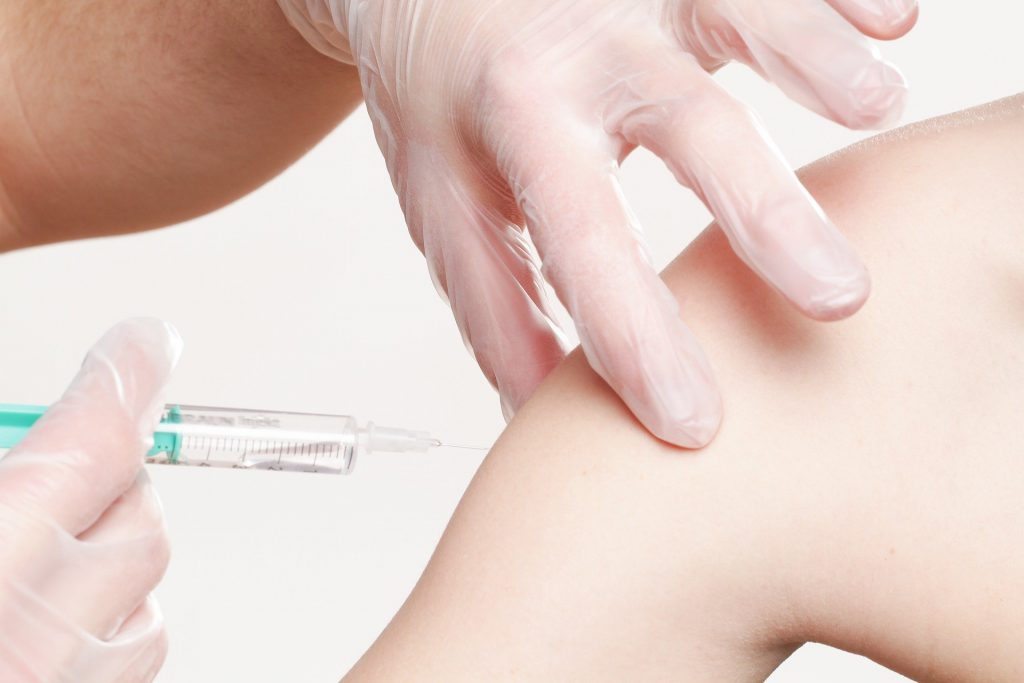COVID-19 Vaccine Rollout A Collaborative Effort in Milwaukee
Things are moving quickly, but officials say a best-case scenario is still mid-spring before widespread availability.
The common refrain surrounding COVID-19 vaccines right now is that things are moving very quickly.
Wisconsin has already started receiving shipments of the Pfizer-Biotech vaccine, and vaccinations have already begun. By Wednesday, the state should have received all of its first shipment — enough to vaccinate 49,705 people.
Dr. Ben Weston, director of medical services for Milwaukee County, said the approval of these vaccines will be “beginning of the end of this pandemic in the U.S.”
The first people in Wisconsin receiving the vaccinations are frontline healthcare workers and residents in long-term care facilities, which include nursing homes and assisted living facilities. These are the people that fall into the first phase — Phase 1a — of the recommended phasing for vaccinations from the Centers for Disease Control and Prevention (CDC).
Public health officials and elected leaders expect it to take months for vaccine production and distribution to scale up to the point of widespread public vaccination. Vaccination at that scale can reasonably be expected by late spring or early summer, Weston said. If everything “goes perfect” it could potentially be mid-spring.
Given this timeline Mayor Tom Barrett said it is important for the public to manage their expectations. He noted that there are nearly 600,000 people in the state that fall into the first phase for vaccinations. Given the size of the first shipment, the state will only be able to vaccinate one out of 12 people that qualify under the first phase with those initial doses.
So it’s important that the public continues to maintain COVID-19 mitigation efforts throughout the rollout of the vaccine. It will be several more months before widespread public vaccination and until the vaccine will have a true impact on the pandemic.
mRNA vaccines do not affect your DNA, Weston said. “In fact, they don’t even enter the part of your cells that contain the DNA,” he said. “As soon as they do their job – they make that little spike protein – they’re broken down by our bodies and they’re gone.”
The vaccines have been administered to tens of thousands of people already during clinical trials. The most common side effects were a sore arm, fatigue and a mild headache. “Any more serious side effects were very rare and similar to other vaccines and other medications all of which have their own side effects,” Weston said.
Dr. Stephanie Schauer, immunization program manager for the Wisconsin Division of Public Health, said that there is not currently enough data on the vaccine’s use on pregnant women, but studies are ongoing. She said if a woman is part of the first phase of priority vaccinations and she is pregnant, she can still choose to be vaccinated, but she should consult with her doctor.
The vaccines are delivered in two doses, with three weeks in between each dose. It is required that you get the second dose in order to reach the 90% effective threshold. And, Schauer said, the vaccines were developed with goal of preventing symptomatic COVID-19 infection and testing positive for the virus. However, “We don’t know about what the vaccine will do in terms of protection of infection, or the ability to transmit,” she said.
“So as the vaccination regime is rolled out, it is important to maintain “proper precautions,” she said. “Vaccine is another layer in the fight against COVID but it doesn’t mean that we can abandon everything else that we have been doing thus far.”
These vaccines will be “game changers,” Weston said, for the healthcare system and for getting back to normal life. But in order for them to have an impact on the trajectory and burden of COVID-19 disease, a “large portion” of the population will need to receive the vaccine.
A Milwaukee County workgroup, consisting of local governments, public health officials, academics, healthcare systems, EMS service providers and members of the business community, is collaborating on the local details of the vaccination program.
Milwaukee Interim Health Commissioner Marlaina Jackson said that the health department has applied to be a vaccinator for COVID-19. Other distribution points that may become available as vaccination is scaled up, including pharmacies, hospitals and other healthcare organizations.
Jackson said the health department is involved in daily meetings planning the rollout of the vaccine. “Changes are happening extremely quickly. Information is being shared extremely quickly,” she said.
If you think stories like this are important, become a member of Urban Milwaukee and help support real, independent journalism. Plus you get some cool added benefits.
More about the Coronavirus Pandemic
- Governors Tony Evers, JB Pritzker, Tim Walz, and Gretchen Whitmer Issue a Joint Statement Concerning Reports that Donald Trump Gave Russian Dictator Putin American COVID-19 Supplies - Gov. Tony Evers - Oct 11th, 2024
- MHD Release: Milwaukee Health Department Launches COVID-19 Wastewater Testing Dashboard - City of Milwaukee Health Department - Jan 23rd, 2024
- Milwaukee County Announces New Policies Related to COVID-19 Pandemic - County Executive David Crowley - May 9th, 2023
- DHS Details End of Emergency COVID-19 Response - Wisconsin Department of Health Services - Apr 26th, 2023
- Milwaukee Health Department Announces Upcoming Changes to COVID-19 Services - City of Milwaukee Health Department - Mar 17th, 2023
- Fitzgerald Applauds Passage of COVID-19 Origin Act - U.S. Rep. Scott Fitzgerald - Mar 10th, 2023
- DHS Expands Free COVID-19 Testing Program - Wisconsin Department of Health Services - Feb 10th, 2023
- MKE County: COVID-19 Hospitalizations Rising - Graham Kilmer - Jan 16th, 2023
- Not Enough Getting Bivalent Booster Shots, State Health Officials Warn - Gaby Vinick - Dec 26th, 2022
- Nearly All Wisconsinites Age 6 Months and Older Now Eligible for Updated COVID-19 Vaccine - Wisconsin Department of Health Services - Dec 15th, 2022
Read more about Coronavirus Pandemic here





















